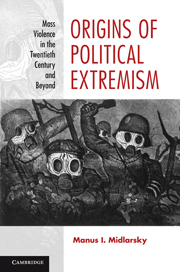Book contents
- Frontmatter
- Contents
- List of figures and tables
- Preface
- Introduction
- PART I Theory and Empirics
- PART II The Secular “Isms”
- PART III An Ostensibly Sacred “Ism”
- PART IV Extreme Nationalism
- PART V Conclusion
- 14 Pathways to Extremism
- 15 Ethics and Morality: The Rejection of Traditional Moral Restraints
- 16 War, Peace, and the Decline of Extremism
- References
- Index
15 - Ethics and Morality: The Rejection of Traditional Moral Restraints
Published online by Cambridge University Press: 05 June 2012
- Frontmatter
- Contents
- List of figures and tables
- Preface
- Introduction
- PART I Theory and Empirics
- PART II The Secular “Isms”
- PART III An Ostensibly Sacred “Ism”
- PART IV Extreme Nationalism
- PART V Conclusion
- 14 Pathways to Extremism
- 15 Ethics and Morality: The Rejection of Traditional Moral Restraints
- 16 War, Peace, and the Decline of Extremism
- References
- Index
Summary
Ancient civilizations may have appreciated the importance of the ephemeral gain as a potential source of aggression against innocent victims. In the Hebrew Bible, from nothing (tohu vavohu) humanity is created in God's image, elevated to live in paradise until the fall from grace and ejection from the Garden of Eden. The loss of paradise and the equally devastating loss of the possibility of living forever (forbidden access to the Tree of Life in the Garden of Eden) were precipitated by Adam and Eve eating from the forbidden Tree of the Knowledge of Good and Evil. Thus, evil and sin are now within the repertory of the human condition. Humiliation-shame, too, is seen in the newly found knowledge of their nakedness that led Adam and Eve to seek fig leaf coverings. The humiliating experience of the Lydian queen seen by a stranger in her nakedness, and its violent consequence, is foreshadowed here. This story will be told later in this chapter.
Earliest of the Abrahamic scriptures, the Hebrew Bible recognized the human potential for sin in reaction to anger and a consequent need for faith-inspired restraints. Immediately following the ejection from paradise, the Bible tells the story of Cain and Abel, in which Cain reacts in anger to the perceived injustice of Abel's favored position and kills his brother. Anger and sin are the virtually instantaneous consequences of the knowledge of good and evil.
- Type
- Chapter
- Information
- Origins of Political ExtremismMass Violence in the Twentieth Century and Beyond, pp. 337 - 359Publisher: Cambridge University PressPrint publication year: 2011

